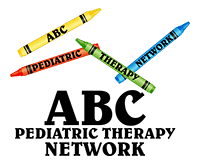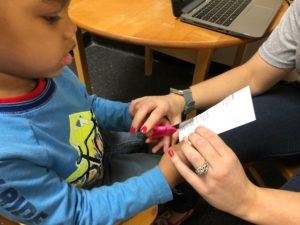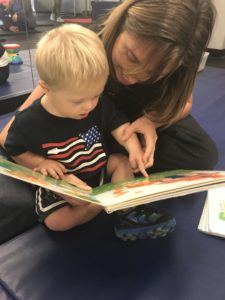readiness
Intellectual skills: Provide your child with fun learning games and toys. Reading to them, pointing out things on the pages and asking questions are great ways to build language and increase interest and creativity.
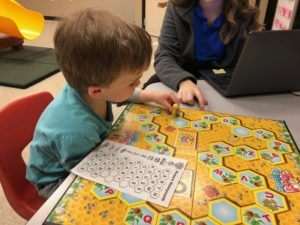
Motivation to learn: Encourage your child to do their best, follow the class rules and show a genuine interest in what they are doing in school. Encourage your child to color, draw, dress themselves and wash their hands. If mom and dad are invested and interested, their kids will want to make their parents proud!
Social skills: Sharing, taking turns, trading toys, waiting turns, eye contact, speaking with an appropriate voice volume and personal space are all skills that will be needed in Kindergarten. As parents, we can guide our children in these skills when we play games and when they play with peers. Community activities provide great opportunities for kids to have fun while building social skills. Craft days at the local craft or hardware store, community sports, the local activity/community center and even a trip to the zoo can all give children experiences to build their social skills.
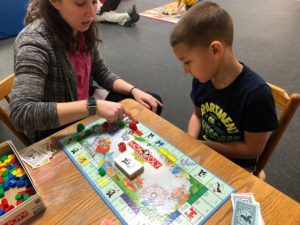
Behavior-management skills: Talk to your child about safety and appropriate behaviors in various settings; how to act on the playground, how to act when an adult is giving directions and how to act when working in a group all require children to use skills that need to be taught ahead of time. Provide time daily for your child to actively play and use their imagination. We can’t expect a child to behave and listen if they don’t have an outlet to play and be a kid. Simple chores can teach your child the value of taking care of things and putting things away; in school they will be expected to do these tasks on a daily basis so it needs to be a skill that is expected at home.
Readiness to learn: Encourage your child to ask questions and help them find the answers! Providing healthy food options, a sense of security, keeping a regular sleep routine, encouraging developmental skills, providing a nurturing home environment, and having parents who show excitement for learning and Kindergarten will get your child ready to learn and lessen anxiety about school!
If you need help getting your child ready for Kindergarten, let us know. We love to help! Go to https://www.abcpediatrictherapy.com for an ABC location near you.
Read MoreHelp your child be comfortable separating from mom and dad: Expose your child to other people early on and consistently. Have grandparents, good friends, babysitters/daycare providers watch your child even for a short time of the day. It’s healthy for babies/toddlers to go through some separation anxiety as this tells you that they recognize mom and dad. However, the exposure to trusting other adults and being comfortable without mom and dad helps your child build confidence and trust in various environments and with and without their parents present.
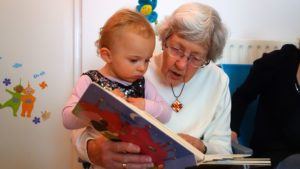
Following another adult’s directions: Teaching your child that they need to listen to you and other adults will help them learn to respect others and will help them to know to listen to their teacher and follow through with assignments as they get older. Following directions will be a big part of their school day; “throw your tissue away, put the crayons in the cup, put your coat on” these will all be frequent directions they will hear and need to follow.
Sitting in a group for Circle Time: In Circle Time, children will be expected to sit, listen to a book, talk about the weather and the day of the week. Parents can prepare their child for this by reading aloud and talking with them about the day so they have practice listening and engaging in conversations.
Working in small groups at Centers: Staying at a Center for 5-10 minutes will take some attention span and working next to their peers will take some parallel play, turn taking and sharing. You can model these behaviors when you play with your child! If you have friends with children about the same age you can set up a play date so they can practice these skills with peers they already know. The more children play, the more creativity and problem solving they will develop.
Being respectful of others: Demonstrating how to treat and talk to others will help your child learn how to be respectful of others and how others should treat them in return.
Learning to get along with peers: Until they are 3 1/2 years old, children will participate in parallel play where they play near each other. Associative play occurs until 4 1/2 when they trade and share toys. At home, you can practice trading, sharing, taking turns with games, pretend play and simple toys.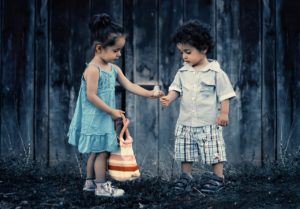
Learning numbers, counting, letters, recognize their name, shapes, colors: Using books and toys, you can talk to your child about colors, shapes and counting, “Let’s count how many bunnies are on the page!” When playing with toys, talk about the color the toy is, “we’re throwing the red ball!” In the car, listen to the Alphabet Song and songs about counting to make learning fun. Have magnetic letters on the refrigerator, put their name up in their room! When helping your child get dressed, talk about the color shirt/pants they have on, the more you build these facts into their daily vocabulary, the more these skills will come naturally.
Social emotional skills: Talk about feelings, express feelings and demonstrate how to handle frustrations in a healthy way. Setting consistent limits and rules will help kids learn what is expected. Teaching empathy will allow your child to be a good friend to others as well. Recognizing their feelings and guiding them through handling their emotions will minimize meltdowns and help them handle frustrations in a healthy way.
If your child needs help with any of the above skills to be ready for preschool, we want to help! Go to https://www.abcpediatrictherapy.com for more tips on how to help your child.
Read More Skip to content
Skip to content